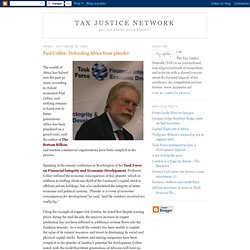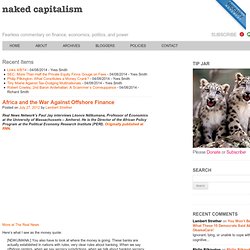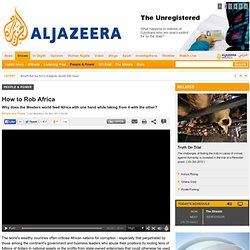

Defending Africa from plunder. The wealth of Africa has halved over the past 30 years, according to Oxford economist Paul Collier, and nothing remains to hand over to future generations.

Africa has been plundered on a grand scale, said the author of The Bottom Billion, and western commercial organisations have been complicit in the process. Speaking at the annual conference in Washington of the Task Force on Financial Integrity and Economic Development, Professor Collier outlined the economic consequences of this plunder, which in addition to shifting about one-third of the Continent's capital stock to offshore private holdings, has also undermined the integrity of entire economic and political systems.
"Plunder is a crime of economic consequences for development" he said, "and the numbers involved are really big. " There are no easy solutions to tackling this problem. Without a strong culture of transparency and democracy, the corrosive effect of natural resource extraction rots the fish from the head. Gfi_africareport_web. Africa and the War Against Offshore Finance. Real News Network’s Paul Jay interviews Léonce Ndikumana, Professor of Economics at the University of Massachussets – Amherst.

He is the Director of the African Policy Program at the Political Economy Research Institute (PERI). Originally published at RNN. Here’s what I see as the money quote: [NDIKUMANA:] You also have to look at where the money is going. These banks are actually established in nations with rules, very clear rules about banking. Yeah, shocked, shocked, but this needs to be said over and over again.
How to Rob Africa - People & Power. The world's wealthy countries often criticise African nations for corruption - especially that perpetrated by those among the continent's government and business leaders who abuse their positions by looting tens of billions of dollars in national assets or the profits from state-owned enterprises that could otherwise be used to relieve the plight of some of the world's poorest peoples.

Yet the West is culpable too in that it often looks the other way when that same dirty money is channelled into bank accounts in Europe and the US. International money laundering regulations are supposed to stop the proceeds of corruption being moved around the world in this way, but it seems the developed world's financial system is far more tempted by the prospect of large cash injections than it should be. This makes them nigh on impossible for investigators to trace, let alone recover. "When these diamonds came, they came as a God-given gift. So who facilitates these transactions? By Anas Aremeyaw Anas. Stealing Africa - Why Poverty? The corporate scramble for Africa. The Marikana mine massacre last week may be the ANC's Sharpeville moment, but the struggle we are witnessing - workers and local communities against corporate giants and in some cases their own governments - is not just unfolding in South Africa.

There is a new corporate scramble for Africa's natural resources. You'd think it should play differently this time. After all, it's a half century since political independence and decades since the first waves of resource nationalism resulted in the nationalisation of extractive industries across the continent. Since then, both sides have come to realise they need the other, and there's this new buzzword of sustainable development. In fact, the stage is set for Resource Conflict 2.0. Some 17 African countries already register high dependence on extractives for hard currency and export earnings and meanwhile up to a dozen countries - Uganda, Kenya, Mozambique, Liberia, Mauritania, perhaps even Somalia - are about to start producing oil or gas.